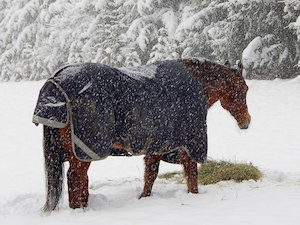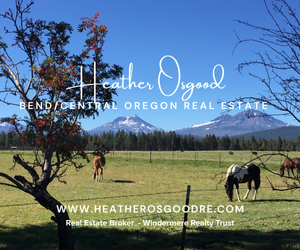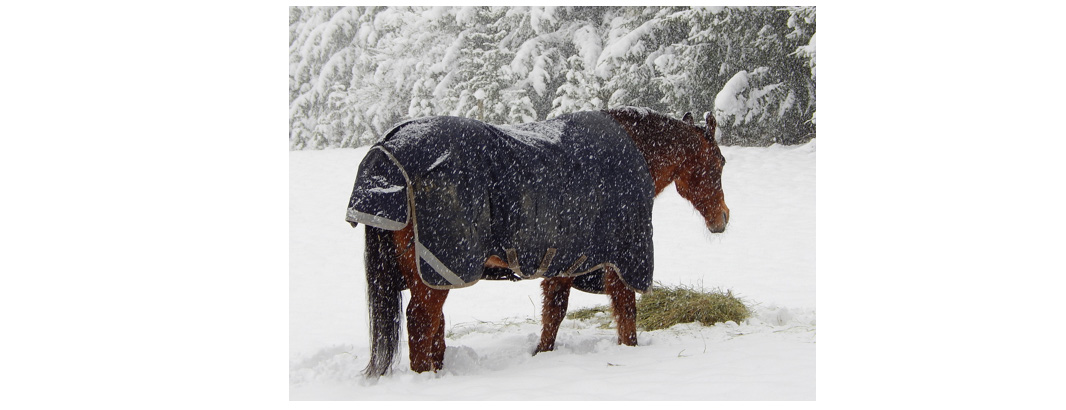Horses Need Room to Move in All Seasons
by Juliet M. Getty, Ph.D

Brrr! It’s cold! Time to take that heavy jacket out of the closet. And time to prepare the barn! Put in extra soft bedding, perhaps some nice relaxing music. Close the windows. Maybe even get those heaters going. Make it cozy. But here’s a secret… horses don’t like cozy!
Horses are naturally claustrophobic and their mental well-being suffers when confined. They instinctively need open spaces, allowing them to run at a moment’s notice. That’s why your horse so often sleeps standing up. And that’s why he needs a herd (even if it’s only one other horse) to stand sentry so he can rest deeply by lying completely prone for a few minutes each day. Lock him in a stall by himself, and his very survival feels threatened.
“My horse likes his stall,” you might say. Horses are creatures of routine and if they are regularly stalled, they succumb to that state. But if you give your horse an opportunity to make his own decision about where he’d rather be, you will have a different horse.
A Personal Story
I rescued Topper years ago when he retired from a life of performance as an eventing horse. When he wasn’t traveling or in training, his time was spent inside a 12’ x 24’ stall, with an hour of outdoor pasture each day. He was beautiful. He was a prince.
I took him home to a new life. The first thing he encountered was pasture and wide open spaces. There were no walls, no confined spaces, no closed gates, no restrictions. He was free!
At first, he was distant, unsociable, easily spooked, and fearful of change. His buddy patiently prepared him for his new life. Together, they roamed the pasture and only went into their stalls during feeding times. He was never trapped inside. When a gust of wind came by to rattle the barn, or he heard an unfamiliar sound inside, he could get out and come back to continue eating when he deemed it to be safe.
Winters are fierce in Ohio. Topper chose to enjoy the cold, sunny days outdoors. But if he felt the need, he could walk inside the barn where there was plenty of hay to enjoy, and heated water to hydrate him. Topper’s transformation was remarkable. He became relaxed, affectionate, and joyful.
Horses Love the Cold! Forget the Blanket (in most cases)
Keep this in mind—your horse is already wearing a winter coat. Why put on another one? Your horse’s hair coat is fully equipped to keep him insulated against the cold (also against the heat, I might add, but that’s a topic for another time). Given protection from wind and wet weather, such as a run-in shed or a stand of trees, he is able to keep sufficiently warm in the coldest weather.
There are cases, however, when a blanket is worthwhile. Horses who shiver in the cold, are underweight, aging, ill, or otherwise frail, may feel better with extra covering. However, don’t put it on and forget about it. Check your horse under his blanket for sweating; a blanket somewhat inhibits the hair coat’s natural ability to protect against cold, so a sweaty blanket that freezes makes it very difficult for the horse to stay warm. It should go without saying that you should check daily for any areas where the blanket may be causing discomfort.
Stall Confinement Leads to Many Preventable Health Issues
Standing in a small indoor space for hours on end can be exceedingly damaging to your horse’s health. It leads to ulcers, colic and other digestive disorders, obesity, porous bones, joint stiffness, poor feet and hair coat, respiratory ailments, loss of muscle mass, and acceleration of aging. While some sort of shelter is a must, using it should be your horse’s choice, not yours.
Other Winter Tips
- Hay should be available 24/7. This is true year-round, but in the winter, horses rely on a steady flow of forage to keep warm.
- Fill in the nutritional gaps that exist in hay. Add a comprehensive vitamin/mineral supplement along with a source of omega 3s. Offer a variety of protein sources that boost the overall protein quality in the diet.
- Prevent dehydration colic. Most colic cases in the winter are caused by reduced consumption of water because it is ice cold. Access to temperature controlled water will ensure adequate intake.
- Don’t forget the salt. Horses need a daily maintenance level of two tablespoons (one ounce) of salt year round. Salt blocks and natural rocks generally do not provide enough salt because they irritate the horse’s smooth tongue. Keep the rocks for extra needs, but either offer coarsely granulated salt in a small bucket or add salt to your horse’s meal.
If You Board Your Horse
You are likely frustrated if your horse is stalled for most of his day. You want what is best for your precious horse but feel you have no choice.
I appeal to you to take a close look at your options. Look into pasture boarding your horse. Seek out facility alternatives. Or perhaps, just perhaps, there is change in the air for you and your horse. Many of my clients have moved to the country so their horses can be in their backyards. The lifestyle shift is truly liberating. You will finally be able to feed and house your horse as he should be — like a horse. Think about it, won’t you?
Bottom Line
Your horse depends on you for his well-being. Appreciate your horse’s instinctive ability to withstand and enjoy cold weather. Respect his need to move on a moment’s notice. Honor the way he was made.

Juliet M. Getty, Ph.D. is an independent equine nutritionist with a wide U.S. and international following. Her research-based approach optimizes equine health by aligning physiology and instincts with correct feeding and nutrition practices. Dr. Getty’s goal is to empower the horseperson with the confidence and knowledge to provide the best nutrition for his or her horse’s needs. Learn more at www.gettyequinenutrition.com.






